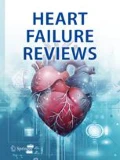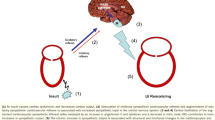Abstract
Beta-blockers are not an homogeneous group of agents. Only three beta-blockers, carvedilol, bisoprolol and metoprolol succinate, have had favorable effects on prognosis in controlled clinical trials in the patients with chronic heart failure. However, pharmacological differences exist between them. Metoprolol and bisoprolol are selective for beta1-adrenergic receptors while carvedilol blocks also beta2-, and alpha1- adrenergic receptors, and has associated antioxidant, anti-endothelin and antiproliferative properties. In COMET carvedilol was associated with a significant reduction in mortality compared to metoprolol tartrate further showing that different beta-blockers may have different effects on the outcome. These differences may be related to the ancillary properties of carvedilol or to its broader antiadrenergic profile. However, also more effective and prolonged blockade of beta1 adrenergic receptors may occur with carvedilol compared to metoprolol.
Similar content being viewed by others
References
Hunt SA, Baker DW, Chin MH, et al. American Collegeof Cardiology/American Heart Association guidelines forthe evaluation and management of chronic heart failurein the adult: a report of the American College of Cardiology/American Heart Association Task Force on Practice Guidelines. (Committee to Revise the 1995 Guidelines for the Evaluation and Management of Heart Failure). 2001 American College of Cardiology Web site. Available at: www.acc.org/clinical/guidelines/failure/hf index.htm
Remme WJ, Swedberg K. Task Force for the Diagnosis and Treatment of Chronic Heart Failure, European Society of Cardiology. Guidelines for the diagnosis and treatment of chronic heart failure. Eur Heart J2001;22:1527-1560.
Metra M, Nodari S, Dei Cas L. Current guidelines in the pharmacological management of heart failure. J Renin Angiotensin Aldosterone Syst JRAAS2004;5(suppl 1):S11-S16.
Yusuf S, Peto R, Lewis J, Collins R, Sleigh P. Beta blockade during and after myocardial infarction: An overview of the randomized trials. Prog Cardiovasc Dis1985;27:335-371.
Freemantle N, Cleland J, Young P, Mason J, Harrison J. â Blockade after myocardial infarction: Systematic review and meta regression analysis. BMJ1999;318:1730-1737.
Houghton T, Freemantle N, Cleland JG. Are beta-blockers effective in patients who develop heart failure soon after myocardial infarction? A meta-regression analysis of randomised trials. Eur J Heart Fail2000;2:333-340.
Chadda K, Goldstein S, Byington R, Curb JD. Effect of propranolol after acute myocardial infarction in patients with congestive heart failure. Circulation1986;73:503-510.
Norwegian Multicentre Group. Timolol induced reduction in mortality and reinfarction in patients surviving acute myocardial infarction. N Engl J Med1981;304:801-807.
European Infarction Study Group. A secondary prevention study with slow release oxprenolol after myocardial.Differences Between Beta-Blockers 129infarction: Morbidity and mortality. Eur Heart J 1984;5:189-202.
Australian and Swedish Pindolol Study Group. The effect of pindolol on the two years mortality after complicated myocardial infarction. Eur Heart J1983;4:367-375.
Dargie HJ. Effect of carvedilol on outcome after myocardial infarction in patients with left-ventricular dysfunction: The CAPRICORN randomised trial. Lancet.2001;357:1385-1390.
Packer M, Bristow MR, Cohn JN, et al. The effect of carvedilol on morbidity and mortality in patients with chronic heart failure. New Engl J Med1996;334:1349-1355.
Australia-New Zealand Heart Failure Research Collaborative Group. Randomised placebo-controlled trial of carvedilol in patients with congestive heart failure due to ischemic heart disease. Lancet1997;349:375-380.
Packer M, Coats AJ, Fowler MB, et al. Effect of carvedilol on survival in severe chronic heart failure. N Engl J Med2001;344:1651-1658.
CIBIS-II Investigators and Committees: The Cardiac In-sufficiency Bisoprolol Study II (CIBIS-II): A randomised trial. Lancet1999;353:9-13.
MERIT-HF Study Group. Effect of metoprolol CR/XL in chronic heart failure: Metoprolol CR/XL Randomised Intervention Trial in Congestive Heart Failure (MERIT-HF). Lancet1999;353:2001-2007.
Hjalmarson A, Goldstein S, Fagerberg S, et al. Effects of controlled-release metoprolol on total mortality, hospitalization and well being in patients with heart failure. JAMA2000;283:1295-1302.
The RESOLVD Investigators. Effects of metoprolol CR in patients with ischemiic and dilated cardiomyopathy. Circulation2000;101:378-384.
Krum H, Roecker EB, Mohacsi P, et al. Effects of initiating carvedilol in patients with severe chronic heart failure: Results from the COPERNICUS Study. JAMA2003;289:712-718.
The Xamoterol in Severe Heart Failure Study Group: Xamoterol in severe heart failure. Lancet1990;336:1-6.
Beta-Blocker Evaluation of Survival Trial Investigators. A trial of the beta-blocker bucindolol in patients with advanced chronic heart failure. NEngl J Med2001;344:1659-1667.
Poole-Wilson PA, Swedberg K, Cleland JG, et al. Comparison f carvedilol and metoprolol on clinical outcomes in patients with chronic heart failure in the Carvedilol Or Metoprolol European Trial (COMET): Randomised controlled trial. Lancet2003;362:7-13.
Poole-Wilson PA, Cleland JG, Di Lenarda A, et al. Rationale and design of the carvedilol or metoprolol European trial in patients with chronic heart failure: COMET. Eur J Heart Fail2002;4:321-329.
The SOLVD investigators. Effect of enalapril on survival in patients with reduced left ventricular ejection fractions and congestive heart failure. N Engl J Med1991;325:293-302.
Remme WJ, Cleland JG, Di Lenarda A, et al. Carvedilol better protects against vascular events than metoprolol in heart failure: Results from COMET. J AmColl Cardiol2004;43(Suppl. A):205A.
Poole-Wilson PA. Commentary on the Carvedilol or Metoprolol European Trial (COMET). Am J Cardiol2004;93(9A):40B-42B.
Bristow MR, Feldman AM, Adams KF Jr, Goldstein S. Selective versus nonselective beta-blockade for heart failure therapy: Are there lessons to be learned from the COMET trial? J Card Fail2003;9:444-453.
Packer M. Do beta-blockers prolong survival in heart failure only by inhibiting the beta1-receptor? A perspective on the results of the COMET trial. J Card Fail2003;9:429-443.
Massie BM. A comment on COMET: How to interpret a positive trial? J Card Fail2003;9:425-428.
Domanski MJ, Krause-Steinrauf H, Massie BM, et al. A comparative analysis of the results from 4 trials of beta-blocker therapy for heart failure: BEST, CIBIS-II, MERIT-HF, and COPERNICUS. J Card Fail2003;9:354-363.
Yancy CW, Fowler MB, Colucci WS, et al. Race and the response to adrenergic blockade with carvedilol in patients with chronic heart failure. N Engl J Med2001;344:1358-1365.
Dargie HJ. Beta blockers in heart failure. Lancet2003;362:2-3.
Hjalmarson A, Waagstein F. COMET: A proposed mechanism of action to explain the results and concerns about dose. Lancet2003;362:1077.
Waagstein F, Bristow MR, Swedberg K, et al. Beneficial effects of metoprolol in idiopathic dilated cardiomyopathy. Lancet1993;342:1441-1446.
Herlitz J, Dellborg M, Karlson BW, et al. Similar risk reduction of death of extended-release metoprolol once daily and immediate-release metoprolol twice daily during 5 years after myocardial infarction. Cardiovasc Drugs Ther1999;13:127-135.
Bristow MR, Gilbert EM, Abraham WT, et al. Carvedilol produces dose-related improvements in left ventricular function and survival in subjects with chronic heart failure. MOCHA Investigators. Circulation1996;94:2807-2816.
Sandberg A, Blomqvist I, Jonsson UE, Lundborg P. Pharmacokinetic and pharmacodynamic properties of a new controlled-release formulation of metoprolol: A comparison with conventional tablets. Eur J Clin Pharmacol1988;33 (Suppl):S9-S14.
Kukin ML, Kalman J, Mannino MM, Buchholz-Varley C, Ocampo O. Beta blockade in congestive heart failure: Persistent adverse haemodynamic effects during chronic treatment with subsequent doses. Heart1997;78:444-449.
Kukin ML, Mannino MM, Freudenberger RS, Kalman J, Buchholz-Varley C, Ocampo O. Hemodynamic comparison of twice daily metoprolol tartrate with once daily metoprolol succinate in congestive heart failure. J AmColl Cardiol2000;35:45-50.
Metra M, Cleland JG, Di Lenarda A, et al. Lack of heart rate effects on the mortality benefits of carvedilol compared to metoprolol in the patients with heart failure: Results from the Carvedilol or Metoprolol European trial (COMET). JAmColl Cardiol2004; 43(Suppl. A):157A. (abstract)
Andreka P, Aiyar N, Olson LC, et al. Bucindolol displays intrinsic sympathomimetic activity in human myocardium. Circulation2002;105:2429-2434.
Maack C, Bohm M, Vlaskin L, et al. Partial agonist activity of bucindolol is dependent on the activation state of the human beta1-adrenergic receptor. Circulation2003;108:348-353.
Bristow MR. Beta-adrenergic receptor blockade in chronic heart failure. Circulation2000;101:558-569.
Bristow M. Antiadrenergic Therapy of Chronic Heart Failure. Surprises and New Opportunities. Circulation2003;107:1100-1102.
Lowes BD, Gilbert EM, Lindenfeld JA, et al. Differential effects of beta-blocking agents on adrenergic activity. Circulation2000;102:II-628 (abstract).
Bristow MR, Krause-Steinrauf H, Nuzzo R, et al. Effect of Baseline or Changes in Adrenergic Activity on Clinical Outcomes in the Beta-blocker Evaluation of Survival Trial (BEST). Circulation2004;110:1437-1442.
Swedberg K, Bristow MR, Cohn JN, et al. The effects of MoxonidineSR, an Imidazoline Agonist, on Plasma Norepinephrine in Patients with Congestive Heart Failure. Circulation2002;105:1797-1803.
Cohn JN, Pfeffer MA, Rouleau J, et al. Adverse mortality effect of central sympathetic inhibition with sustained-release moxonidine in patients with heart failure (MOXCON). Eur J Heart Failure2003;5:659-667.
Bristow MR. Mechanism of action of beta-blocking agents in heart failure. Am J Cardiol1997;80(11A):26L-40L.
Packer M. Beta-adrenergic blockade in chronic heart failure: Principles, progress, and practice. Prog Cardiovasc Dis1998;41(Suppl 1):39-52.
Metra M, Nodari S, D'Aloia A, Bontempi L, Boldi E, Dei Cas L. A rationale for the use of beta-blockers as standard treatment for heart failure. Am Heart J2000;139:511-521.
Metra M, Nodari S, Dei Cas L. Beta-blockade in heart failure: Selective versus nonselective agents. AmJ Cardiovasc Drugs2001;1:3-14.
Hall JA, Kaumann AJ, Brown MJ. Selective beta1-adrenoceptor blockade enhances positive inotropic responses to endogenous catecholamines mediated through beta2-adrenoceptors in human atrial myocardium. Circ Res1990;66:1610-1623.
Hall JA, Petch MA, Brown MJ. Intracoronary injections of salbutamol demonstrate the presence of functional beta 2-adrenoceptors in the human heart. Circ Res1989;65:546-553.
Newton GE, Parker JD. Acute effects of beta 1-selective and nonselective beta-adrenergic receptor blockade on cardiac sympathetic activity in congestive heart failure. Circulation. 1996;94:353-358.
Du XJ, Autelitano D, Dilley RJ, Wang B, Dart AM, Woodcock EA. â 2-adrenergic receptor overexpression exacerbates development of heart failure after aortic stenosis. Circulation2000;101:71-77.
Billman GE, Castillo LC, Hensley J, Hohl CM, Altschuld RA: Beta2-adrenergic receptor antagonists protect against ventricular fibrillation. In vivoand in vitro evidence for enhanced sensitivity to beta2-adrenergic stimulation in animals susceptible to sudden death. Circulation 1997;96:1914-1922.
Stroe AF, Gheorghiade M. Carvedilol: Beta-blockade and beyond. Rev Cardiovasc Med2004;5(Suppl 1):S18-S27.
Singh K, Xiao L, Remondino A, Sawyer DB, Colucci WS. Adrenergic regulation of cardiac myocyte apoptosis. J Cell Physiol2001;189:257-265.
Xiao R-P, Zhang S-I, Chakir K, et al. Enhanced Gi Signaling Selectively Negates beta2-Adrenergic Receptor(AR)-but Not beta1-AR-Mediated Positive Inotropic Ef-fect in Myocytes From Failing Rat Hearts. Circulation2003;108:1633-1639.
Gong H, Sung H, Koch WJ, et al. Specific Beta-2AR Blocker ICI 118,551 actively decreases contraction through a Gicoupled form of the Beta-2AR in myocytes from failing human heart. Circulation. 2002;105:2497-2503.
Asano K, Zisman LS, Yoshikawa T, Headley V, Bristow MR, Port JD. Bucindolol, a nonselective beta 1-and beta 2-adrenergic receptor antagonist, decreases beta-adrenergic receptor density in cultured embryonic chick cardiac myocyte membranes. J Cardiovasc Pharmacol2001;37:678-691.
Metra M, Giubbini R, Nodari S, Boldi E, Modena MG, Dei Cas L. Differential effects of beta-blockers in patients with heart failure: Aprospective, randomized, double-blind comparison of the long-term effects of metoprolol versus carvedilol. Circulation2000;102:546-551.
Metra M, Nodari S, D'Aloia A, et al. Beta-blocker therapy influences the hemodynamic response to inotropic agents in patients with heart failure: A randomized comparison of dobutamine and enoximone before and after chronic treatment with metoprolol or carvedilol. J AmColl Cardiol2002;40:1248-1258.
Kindermann M, Maack C, Schaller S, et al. Carvedilol but not metoprolol reduces beta-adrenergic responsiveness after complete elimination from plasma in vivo. Circulation2004;109:3182-3190.
Author information
Authors and Affiliations
Corresponding author
Rights and permissions
About this article
Cite this article
Metra, M., Cas, L.D., di Lenarda, A. et al. Beta-Blockers in Heart Failure: Are Pharmacological Differences Clinically Important?. Heart Fail Rev 9, 123–130 (2004). https://doi.org/10.1023/B:HREV.0000046367.99002.a4
Issue Date:
DOI: https://doi.org/10.1023/B:HREV.0000046367.99002.a4




